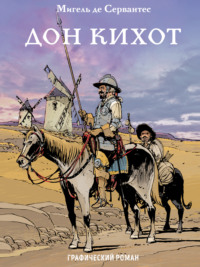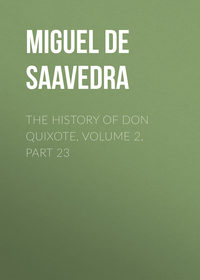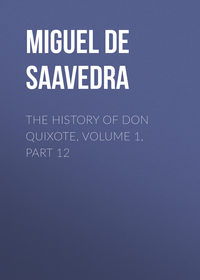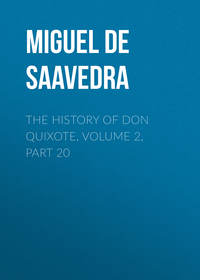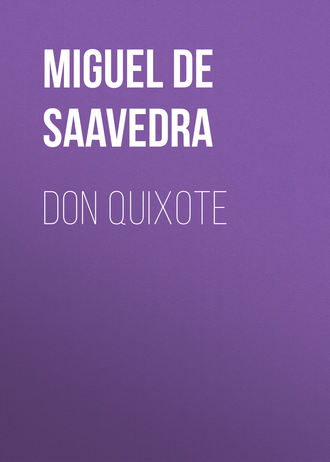 полная версия
полная версияDon Quixote
While engaged in this discourse they were making their way through a wood that lay beyond the road, when suddenly, without expecting anything of the kind, Don Quixote found himself caught in some nets of green cord stretched from one tree to another; and unable to conceive what it could be, he said to Sancho, "Sancho, it strikes me this affair of these nets will prove one of the strangest adventures imaginable. May I die if the enchanters that persecute me are not trying to entangle me in them and delay my journey, by way of revenge for my obduracy towards Altisidora. Well then let me tell them that if these nets, instead of being green cord, were made of the hardest diamonds, or stronger than that wherewith the jealous god of blacksmiths enmeshed Venus and Mars, I would break them as easily as if they were made of rushes or cotton threads." But just as he was about to press forward and break through all, suddenly from among some trees two shepherdesses of surpassing beauty presented themselves to his sight – or at least damsels dressed like shepherdesses, save that their jerkins and sayas were of fine brocade; that is to say, the sayas were rich farthingales of gold embroidered tabby. Their hair, that in its golden brightness vied with the beams of the sun itself, fell loose upon their shoulders and was crowned with garlands twined with green laurel and red everlasting; and their years to all appearance were not under fifteen nor above eighteen.
Such was the spectacle that filled Sancho with amazement, fascinated Don Quixote, made the sun halt in his course to behold them, and held all four in a strange silence. One of the shepherdesses, at length, was the first to speak and said to Don Quixote, "Hold, sir knight, and do not break these nets; for they are not spread here to do you any harm, but only for our amusement; and as I know you will ask why they have been put up, and who we are, I will tell you in a few words. In a village some two leagues from this, where there are many people of quality and rich gentlefolk, it was agreed upon by a number of friends and relations to come with their wives, sons and daughters, neighbours, friends and kinsmen, and make holiday in this spot, which is one of the pleasantest in the whole neighbourhood, setting up a new pastoral Arcadia among ourselves, we maidens dressing ourselves as shepherdesses and the youths as shepherds. We have prepared two eclogues, one by the famous poet Garcilasso, the other by the most excellent Camoens, in its own Portuguese tongue, but we have not as yet acted them. Yesterday was the first day of our coming here; we have a few of what they say are called field-tents pitched among the trees on the bank of an ample brook that fertilises all these meadows; last night we spread these nets in the trees here to snare the silly little birds that startled by the noise we make may fly into them. If you please to be our guest, senor, you will be welcomed heartily and courteously, for here just now neither care nor sorrow shall enter."
She held her peace and said no more, and Don Quixote made answer, "Of a truth, fairest lady, Actaeon when he unexpectedly beheld Diana bathing in the stream could not have been more fascinated and wonderstruck than I at the sight of your beauty. I commend your mode of entertainment, and thank you for the kindness of your invitation; and if I can serve you, you may command me with full confidence of being obeyed, for my profession is none other than to show myself grateful, and ready to serve persons of all conditions, but especially persons of quality such as your appearance indicates; and if, instead of taking up, as they probably do, but a small space, these nets took up the whole surface of the globe, I would seek out new worlds through which to pass, so as not to break them; and that ye may give some degree of credence to this exaggerated language of mine, know that it is no less than Don Quixote of La Mancha that makes this declaration to you, if indeed it be that such a name has reached your ears."
"Ah! friend of my soul," instantly exclaimed the other shepherdess, "what great good fortune has befallen us! Seest thou this gentleman we have before us? Well then let me tell thee he is the most valiant and the most devoted and the most courteous gentleman in all the world, unless a history of his achievements that has been printed and I have read is telling lies and deceiving us. I will lay a wager that this good fellow who is with him is one Sancho Panza his squire, whose drolleries none can equal."
"That's true," said Sancho; "I am that same droll and squire you speak of, and this gentleman is my master Don Quixote of La Mancha, the same that's in the history and that they talk about."
"Oh, my friend," said the other, "let us entreat him to stay; for it will give our fathers and brothers infinite pleasure; I too have heard just what thou hast told me of the valour of the one and the drolleries of the other; and what is more, of him they say that he is the most constant and loyal lover that was ever heard of, and that his lady is one Dulcinea del Toboso, to whom all over Spain the palm of beauty is awarded."
"And justly awarded," said Don Quixote, "unless, indeed, your unequalled beauty makes it a matter of doubt. But spare yourselves the trouble, ladies, of pressing me to stay, for the urgent calls of my profession do not allow me to take rest under any circumstances."
At this instant there came up to the spot where the four stood a brother of one of the two shepherdesses, like them in shepherd costume, and as richly and gaily dressed as they were. They told him that their companion was the valiant Don Quixote of La Mancha, and the other Sancho his squire, of whom he knew already from having read their history. The gay shepherd offered him his services and begged that he would accompany him to their tents, and Don Quixote had to give way and comply. And now the game was started, and the nets were filled with a variety of birds that deceived by the colour fell into the danger they were flying from. Upwards of thirty persons, all gaily attired as shepherds and shepherdesses, assembled on the spot, and were at once informed who Don Quixote and his squire were, whereat they were not a little delighted, as they knew of him already through his history. They repaired to the tents, where they found tables laid out, and choicely, plentifully, and neatly furnished. They treated Don Quixote as a person of distinction, giving him the place of honour, and all observed him, and were full of astonishment at the spectacle. At last the cloth being removed, Don Quixote with great composure lifted up his voice and said:
"One of the greatest sins that men are guilty of is – some will say pride – but I say ingratitude, going by the common saying that hell is full of ingrates. This sin, so far as it has lain in my power, I have endeavoured to avoid ever since I have enjoyed the faculty of reason; and if I am unable to requite good deeds that have been done me by other deeds, I substitute the desire to do so; and if that be not enough I make them known publicly; for he who declares and makes known the good deeds done to him would repay them by others if it were in his power, and for the most part those who receive are the inferiors of those who give. Thus, God is superior to all because he is the supreme giver, and the offerings of man fall short by an infinite distance of being a full return for the gifts of God; but gratitude in some degree makes up for this deficiency and shortcoming. I therefore, grateful for the favour that has been extended to me here, and unable to make a return in the same measure, restricted as I am by the narrow limits of my power, offer what I can and what I have to offer in my own way; and so I declare that for two full days I will maintain in the middle of this highway leading to Saragossa, that these ladies disguised as shepherdesses, who are here present, are the fairest and most courteous maidens in the world, excepting only the peerless Dulcinea del Toboso, sole mistress of my thoughts, be it said without offence to those who hear me, ladies and gentlemen."
On hearing this Sancho, who had been listening with great attention, cried out in a loud voice, "Is it possible there is anyone in the world who will dare to say and swear that this master of mine is a madman? Say, gentlemen shepherds, is there a village priest, be he ever so wise or learned, who could say what my master has said; or is there knight-errant, whatever renown he may have as a man of valour, that could offer what my master has offered now?"
Don Quixote turned upon Sancho, and with a countenance glowing with anger said to him, "Is it possible, Sancho, there is anyone in the whole world who will say thou art not a fool, with a lining to match, and I know not what trimmings of impertinence and roguery? Who asked thee to meddle in my affairs, or to inquire whether I am a wise man or a blockhead? Hold thy peace; answer me not a word; saddle Rocinante if he be unsaddled; and let us go to put my offer into execution; for with the right that I have on my side thou mayest reckon as vanquished all who shall venture to question it;" and in a great rage, and showing his anger plainly, he rose from his seat, leaving the company lost in wonder, and making them feel doubtful whether they ought to regard him as a madman or a rational being. In the end, though they sought to dissuade him from involving himself in such a challenge, assuring him they admitted his gratitude as fully established, and needed no fresh proofs to be convinced of his valiant spirit, as those related in the history of his exploits were sufficient, still Don Quixote persisted in his resolve; and mounted on Rocinante, bracing his buckler on his arm and grasping his lance, he posted himself in the middle of a high road that was not far from the green meadow. Sancho followed on Dapple, together with all the members of the pastoral gathering, eager to see what would be the upshot of his vainglorious and extraordinary proposal.
Don Quixote, then, having, as has been said, planted himself in the middle of the road, made the welkin ring with words to this effect: "Ho ye travellers and wayfarers, knights, squires, folk on foot or on horseback, who pass this way or shall pass in the course of the next two days! Know that Don Quixote of La Mancha, knight-errant, is posted here to maintain by arms that the beauty and courtesy enshrined in the nymphs that dwell in these meadows and groves surpass all upon earth, putting aside the lady of my heart, Dulcinea del Toboso. Wherefore, let him who is of the opposite opinion come on, for here I await him."
Twice he repeated the same words, and twice they fell unheard by any adventurer; but fate, that was guiding affairs for him from better to better, so ordered it that shortly afterwards there appeared on the road a crowd of men on horseback, many of them with lances in their hands, all riding in a compact body and in great haste. No sooner had those who were with Don Quixote seen them than they turned about and withdrew to some distance from the road, for they knew that if they stayed some harm might come to them; but Don Quixote with intrepid heart stood his ground, and Sancho Panza shielded himself with Rocinante's hind-quarters. The troop of lancers came up, and one of them who was in advance began shouting to Don Quixote, "Get out of the way, you son of the devil, or these bulls will knock you to pieces!"
"Rabble!" returned Don Quixote, "I care nothing for bulls, be they the fiercest Jarama breeds on its banks. Confess at once, scoundrels, that what I have declared is true; else ye have to deal with me in combat."
The herdsman had no time to reply, nor Don Quixote to get out of the way even if he wished; and so the drove of fierce bulls and tame bullocks, together with the crowd of herdsmen and others who were taking them to be penned up in a village where they were to be run the next day, passed over Don Quixote and over Sancho, Rocinante and Dapple, hurling them all to the earth and rolling them over on the ground. Sancho was left crushed, Don Quixote scared, Dapple belaboured and Rocinante in no very sound condition.
They all got up, however, at length, and Don Quixote in great haste, stumbling here and falling there, started off running after the drove, shouting out, "Hold! stay! ye rascally rabble, a single knight awaits you, and he is not of the temper or opinion of those who say, 'For a flying enemy make a bridge of silver.'" The retreating party in their haste, however, did not stop for that, or heed his menaces any more than last year's clouds. Weariness brought Don Quixote to a halt, and more enraged than avenged he sat down on the road to wait until Sancho, Rocinante and Dapple came up. When they reached him master and man mounted once more, and without going back to bid farewell to the mock or imitation Arcadia, and more in humiliation than contentment, they continued their journey.
CHAPTER LIX.
WHEREIN IS RELATED THE STRANGE THING, WHICH MAY BE REGARDED AS AN ADVENTURE, THAT HAPPENED DON QUIXOTE
A clear limpid spring which they discovered in a cool grove relieved Don Quixote and Sancho of the dust and fatigue due to the unpolite behaviour of the bulls, and by the side of this, having turned Dapple and Rocinante loose without headstall or bridle, the forlorn pair, master and man, seated themselves. Sancho had recourse to the larder of his alforjas and took out of them what he called the prog; Don Quixote rinsed his mouth and bathed his face, by which cooling process his flagging energies were revived. Out of pure vexation he remained without eating, and out of pure politeness Sancho did not venture to touch a morsel of what was before him, but waited for his master to act as taster. Seeing, however, that, absorbed in thought, he was forgetting to carry the bread to his mouth, he said never a word, and trampling every sort of good breeding under foot, began to stow away in his paunch the bread and cheese that came to his hand.
"Eat, Sancho my friend," said Don Quixote; "support life, which is of more consequence to thee than to me, and leave me to die under the pain of my thoughts and pressure of my misfortunes. I was born, Sancho, to live dying, and thou to die eating; and to prove the truth of what I say, look at me, printed in histories, famed in arms, courteous in behaviour, honoured by princes, courted by maidens; and after all, when I looked forward to palms, triumphs, and crowns, won and earned by my valiant deeds, I have this morning seen myself trampled on, kicked, and crushed by the feet of unclean and filthy animals. This thought blunts my teeth, paralyses my jaws, cramps my hands, and robs me of all appetite for food; so much so that I have a mind to let myself die of hunger, the cruelest death of all deaths."
"So then," said Sancho, munching hard all the time, "your worship does not agree with the proverb that says, 'Let Martha die, but let her die with a full belly.' I, at any rate, have no mind to kill myself; so far from that, I mean to do as the cobbler does, who stretches the leather with his teeth until he makes it reach as far as he wants. I'll stretch out my life by eating until it reaches the end heaven has fixed for it; and let me tell you, senor, there's no greater folly than to think of dying of despair as your worship does; take my advice, and after eating lie down and sleep a bit on this green grass-mattress, and you will see that when you awake you'll feel something better."
Don Quixote did as he recommended, for it struck him that Sancho's reasoning was more like a philosopher's than a blockhead's, and said he, "Sancho, if thou wilt do for me what I am going to tell thee my ease of mind would be more assured and my heaviness of heart not so great; and it is this; to go aside a little while I am sleeping in accordance with thy advice, and, making bare thy carcase to the air, to give thyself three or four hundred lashes with Rocinante's reins, on account of the three thousand and odd thou art to give thyself for the disenchantment of Dulcinea; for it is a great pity that the poor lady should be left enchanted through thy carelessness and negligence."
"There is a good deal to be said on that point," said Sancho; "let us both go to sleep now, and after that, God has decreed what will happen. Let me tell your worship that for a man to whip himself in cold blood is a hard thing, especially if the stripes fall upon an ill-nourished and worse-fed body. Let my lady Dulcinea have patience, and when she is least expecting it, she will see me made a riddle of with whipping, and 'until death it's all life;' I mean that I have still life in me, and the desire to make good what I have promised."
Don Quixote thanked him, and ate a little, and Sancho a good deal, and then they both lay down to sleep, leaving those two inseparable friends and comrades, Rocinante and Dapple, to their own devices and to feed unrestrained upon the abundant grass with which the meadow was furnished. They woke up rather late, mounted once more and resumed their journey, pushing on to reach an inn which was in sight, apparently a league off. I say an inn, because Don Quixote called it so, contrary to his usual practice of calling all inns castles. They reached it, and asked the landlord if they could put up there. He said yes, with as much comfort and as good fare as they could find in Saragossa. They dismounted, and Sancho stowed away his larder in a room of which the landlord gave him the key. He took the beasts to the stable, fed them, and came back to see what orders Don Quixote, who was seated on a bench at the door, had for him, giving special thanks to heaven that this inn had not been taken for a castle by his master. Supper-time came, and they repaired to their room, and Sancho asked the landlord what he had to give them for supper. To this the landlord replied that his mouth should be the measure; he had only to ask what he would; for that inn was provided with the birds of the air and the fowls of the earth and the fish of the sea.
"There's no need of all that," said Sancho; "if they'll roast us a couple of chickens we'll be satisfied, for my master is delicate and eats little, and I'm not over and above gluttonous."
The landlord replied he had no chickens, for the kites had stolen them.
"Well then," said Sancho, "let senor landlord tell them to roast a pullet, so that it is a tender one."
"Pullet! My father!" said the landlord; "indeed and in truth it's only yesterday I sent over fifty to the city to sell; but saving pullets ask what you will."
"In that case," said Sancho, "you will not be without veal or kid."
"Just now," said the landlord, "there's none in the house, for it's all finished; but next week there will be enough and to spare."
"Much good that does us," said Sancho; "I'll lay a bet that all these short-comings are going to wind up in plenty of bacon and eggs."
"By God," said the landlord, "my guest's wits must be precious dull; I tell him I have neither pullets nor hens, and he wants me to have eggs! Talk of other dainties, if you please, and don't ask for hens again."
"Body o' me!" said Sancho, "let's settle the matter; say at once what you have got, and let us have no more words about it."
"In truth and earnest, senor guest," said the landlord, "all I have is a couple of cow-heels like calves' feet, or a couple of calves' feet like cowheels; they are boiled with chick-peas, onions, and bacon, and at this moment they are crying 'Come eat me, come eat me."
"I mark them for mine on the spot," said Sancho; "let nobody touch them; I'll pay better for them than anyone else, for I could not wish for anything more to my taste; and I don't care a pin whether they are feet or heels."
"Nobody shall touch them," said the landlord; "for the other guests I have, being persons of high quality, bring their own cook and caterer and larder with them."
"If you come to people of quality," said Sancho, "there's nobody more so than my master; but the calling he follows does not allow of larders or store-rooms; we lay ourselves down in the middle of a meadow, and fill ourselves with acorns or medlars."
Here ended Sancho's conversation with the landlord, Sancho not caring to carry it any farther by answering him; for he had already asked him what calling or what profession it was his master was of.
Supper-time having come, then, Don Quixote betook himself to his room, the landlord brought in the stew-pan just as it was, and he sat himself down to sup very resolutely. It seems that in another room, which was next to Don Quixote's, with nothing but a thin partition to separate it, he overheard these words, "As you live, Senor Don Jeronimo, while they are bringing supper, let us read another chapter of the Second Part of 'Don Quixote of La Mancha.'"
The instant Don Quixote heard his own name, he started to his feet and listened with open ears to catch what they said about him, and heard the Don Jeronimo who had been addressed say in reply, "Why would you have us read that absurd stuff, Don Juan, when it is impossible for anyone who has read the First Part of the history of 'Don Quixote of La Mancha' to take any pleasure in reading this Second Part?"
"For all that," said he who was addressed as Don Juan, "we shall do well to read it, for there is no book so bad but it has something good in it. What displeases me most in it is that it represents Don Quixote as now cured of his love for Dulcinea del Toboso."
On hearing this Don Quixote, full of wrath and indignation, lifted up his voice and said, "Whoever he may be who says that Don Quixote of La Mancha has forgotten or can forget Dulcinea del Toboso, I will teach him with equal arms that what he says is very far from the truth; for neither can the peerless Dulcinea del Toboso be forgotten, nor can forgetfulness have a place in Don Quixote; his motto is constancy, and his profession to maintain the same with his life and never wrong it."
"Who is this that answers us?" said they in the next room.
"Who should it be," said Sancho, "but Don Quixote of La Mancha himself, who will make good all he has said and all he will say; for pledges don't trouble a good payer."
Sancho had hardly uttered these words when two gentlemen, for such they seemed to be, entered the room, and one of them, throwing his arms round Don Quixote's neck, said to him, "Your appearance cannot leave any question as to your name, nor can your name fail to identify your appearance; unquestionably, senor, you are the real Don Quixote of La Mancha, cynosure and morning star of knight-errantry, despite and in defiance of him who has sought to usurp your name and bring to naught your achievements, as the author of this book which I here present to you has done;" and with this he put a book which his companion carried into the hands of Don Quixote, who took it, and without replying began to run his eye over it; but he presently returned it saying, "In the little I have seen I have discovered three things in this author that deserve to be censured. The first is some words that I have read in the preface; the next that the language is Aragonese, for sometimes he writes without articles; and the third, which above all stamps him as ignorant, is that he goes wrong and departs from the truth in the most important part of the history, for here he says that my squire Sancho Panza's wife is called Mari Gutierrez, when she is called nothing of the sort, but Teresa Panza; and when a man errs on such an important point as this there is good reason to fear that he is in error on every other point in the history."
"A nice sort of historian, indeed!" exclaimed Sancho at this; "he must know a deal about our affairs when he calls my wife Teresa Panza, Mari Gutierrez; take the book again, senor, and see if I am in it and if he has changed my name."
"From your talk, friend," said Don Jeronimo, "no doubt you are Sancho Panza, Senor Don Quixote's squire."
"Yes, I am," said Sancho; "and I'm proud of it."
"Faith, then," said the gentleman, "this new author does not handle you with the decency that displays itself in your person; he makes you out a heavy feeder and a fool, and not in the least droll, and a very different being from the Sancho described in the First Part of your master's history."
"God forgive him," said Sancho; "he might have left me in my corner without troubling his head about me; 'let him who knows how ring the bells; 'Saint Peter is very well in Rome.'"


